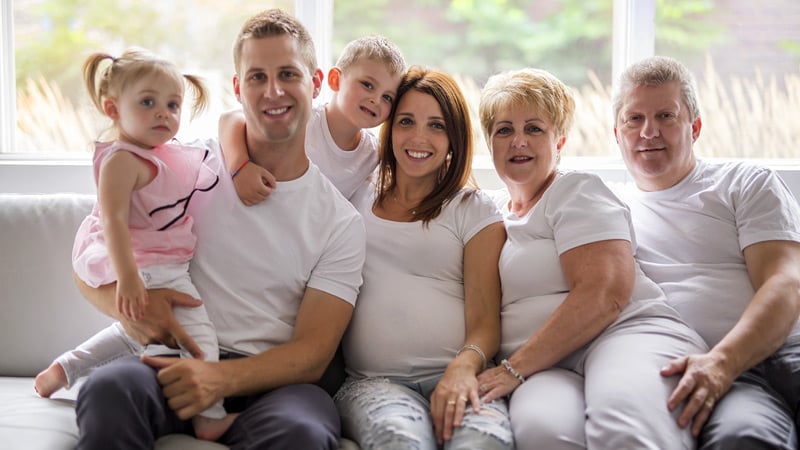
When a patient has an inherited cancer-associated gene, it is desirable — but not easy — to have other family members tested. In the United States, the difficulty primarily stems from privacy regulations that prohibit direct contact of relatives by patients' clinicians.
But a novel collaboration in California indicates that a privacy work-around — allowing a testing laboratory to directly engage in outreach — yields a relatively high testing rate among relatives of previously identified cancer gene carriers.
In a new study, there was a 47.5% participation rate among nearly 2300 invitees for this "cascade testing," which is considerably higher than the roughly 30% rate typically seen at specialized genetics clinics, report the authors, led by Jennifer Caswell-Jin, MD, of the Stanford University School of Medicine in California.
Cascade testing refers to the process whereby testing for cancer susceptibility gene mutations is offered to family members of a person who is a carrier of a pathogenic germline variant, such as BRCA1/2, and who are thus at increased risk for various cancers.
"Cascade testing has significant public health implications for early cancer detection and even prevention," said Caswell-Jin in a press statement.
However, she and her coauthors acknowledge that their new study does not address subsequent steps, such as screening or preventive surgery, as well as related outcomes.
The research was published online September 18 in the Journal of the National Cancer Institute.
Privacy regulations are an impediment to family testing, acknowledged Xavier Llor, MD, PhD, codirector of cancer genetics and prevention, Yale Cancer Center, New Haven, Connecticut, who was not involved in the study.
"We give a patient a letter and say, 'Share it with your family members.' And that's the end of it," he told Medscape Medical News.
"We have relatively low success with cascade testing and feel very frustrated about not reaching additional family members," added Llor.
The new study results are proof of the virtues of being proactive, he also said, and will "hopefully move the needle a little bit" in how the field conducts outreach to families.
How It Worked
For their study, Caswell-Jin and colleagues at Stanford worked with the Color Genomics laboratory (Burlingame, California) to contact and invite first-degree relatives (FDRs), such as mothers, fathers, siblings, and children, for testing.
The laboratory used email addresses provided by the carrier of the gene to send information about genetic testing to FDRs.
The laboratory's email to FDRs contained a link to a Web-based portal that provided written and video education about the program. FDRs could create an account and complete an application to participate.
Genetic testing (using Color Genomics' multiplex sequencing of 30 cancer-associated genes) was offered to 2280 FDRs of the 1101 study applicants.
The term "applicant" refers to both carriers (n = 741) and their FDRs (n = 360), who acted as inviters of other relatives. In other words, in the study, both carriers and FDRs, such as a mother, could invite another FDR to participate.
During the follow-up period (median, 216 days), 1083 of the 2280 invited FDRs (47.5%) underwent testing.
Of the tested FDRs, 48.1% carried the identified familial pathogenic variant (consistent with the study carrier). Another 41% tested negative for variants, and 7.6% had variants of uncertain significance.
About 5% of tested FDRs had different, unexpected pathogenic variants. This is in keeping with other research, said the study authors and Yale's Llor.
Notably, there were no differences in testing by gene. Relatives who were invited because of a pathogenic variant associated with a well-characterized gene (such as BRCA1/2, MLH1, MSH2, and TP53) were tested as often as those with a relative who had a pathogenic variant of a less well-characterized gene (48.1% vs 45.9%).
"One unique thing about this study is that it isn't focused on any single gene," said Caswell-Jin.
Low Cost?
The study authors also credit the "low" cost of the $50 Color Genomics test, a multiplex sequencing of 30 cancer-associated genes, for the high rate of testing uptake.
Similar testing can cost $500 or more and is not covered by Medicare and may not be covered by private insurance, say the authors.
But Llor said that the $50 price tag was not the key to the increased participation. He explained that it is "dirt cheap" to have relatives tested for only one identified mutation, such as BRCA, which is how the testing is typically performed.
The study authors point out, however, that they did not limit testing to the one identified pathogenic variant; the Color Genomics panel tested for 30.
The Stanford team credits the combined use of the online portal, the low cost, and the laboratory's contacting FDRs for engaging relatives in the cascade testing.
"We've found that this approach has been remarkably successful in overcoming traditional barriers to reaching and testing a patient's relatives," summarized senior author Allison Kurian, MD, of the Stanford Cancer Institute.
The study was supported by the BRCA Foundation, the Damon Runyan Cancer Research Foundation, and Color Genomics. Dr Kurian has financial ties to Myriad Genetics for an unrelated project.
J Natl Cancer Inst. 2018. Published online September 18, 2018. Full text
Follow Medscape senior journalist Nick Mulcahy on Twitter: @MulcahyNick.
For more from Medscape Oncology, follow us on Twitter: @MedscapeOnc.
https://www.medscape.com/viewarticle/902449Bagikan Berita Ini
















0 Response to "A Privacy Work-Around for Hereditary Cancer Testing"
Post a Comment